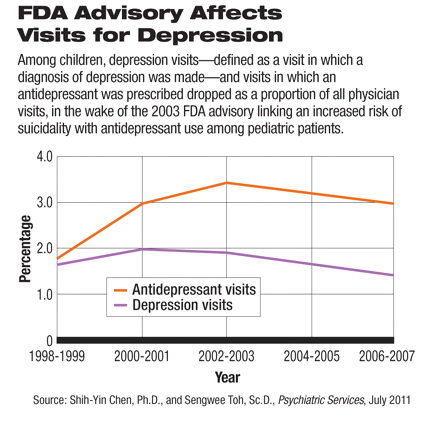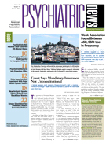The number of children's outpatient office visits for depression and visits during which an antidepressant was prescribed dropped in the wake of the 2003 U.S. Food and Drug Administration (FDA) advisory linking an increased risk of suicidality with antidepressant use among pediatric patients.
Yet children diagnosed with depression appeared no less likely to be prescribed antidepressants than before the warning, according to an analysis appearing in the July Psychiatric Services.
"We observed a decline among children in the number of depression visits with an antidepressant prescribed after the FDA advisory, a trend that seemed to parallel an overall decrease in depression visits," authors Shih-Yin Chen, Ph.D., and Sengwee Toh, Sc.D., wrote. "When we further assessed the trend in terms of proportion, the likelihood of prescribing an antidepressant among visits with a diagnosis of depression among children remained relatively stable at approximately 65 percent just before and after the advisory.... These findings suggest that the FDA advisory might have led to fewer numbers of depression visits overall and of depression visits with an antidepressant prescribed. But even with this decline, if children were actually diagnosed as having depression, they might not have been any less likely to have been prescribed an antidepressant after the advisory than they had been before it."
Chen is with United BioSource Corporation in Lexington, Mass., and Toh is with the Department of Population Medicine at Harvard Medical School and the Harvard Pilgrim Health Care Institute in Boston.
In the study, the investigators evaluated the national trends in prescribing pharmacologic treatments for pediatric depression before and after a 2003 FDA advisory linking suicidal risk with SSRI antidepressants in pediatric populations. They looked at national estimates of outpatient visits between 1998 and 2007 in which there was a diagnosis of depression and/or prescription of an antidepressant for children aged 5 to 17 and for adults using data from the National Ambulatory Medical Care Survey (NAMCS) and the National Hospital Ambulatory Medical Care Survey.
They found that depression visits increased between 1998 and 2003 (3.2 million to 4.3 million, respectively) but decreased to 3.2 million by 2007. Antidepressant visits increased from 1998 to 2003 from 3.4 to 7.6 million, but dropped to 6.7 million in 2007.
Depression visits during which an antidepressant was prescribed rose from 1998 to 2003 from 1.7 million to 2.8 million, respectively, but dropped to 2.1 million in 2007.
Nevertheless, the proportion of depression visits with an antidepressant prescribed remained stable in 2005 (65 percent) and in 2007 (64 percent), the result, the authors suggested, of more prescribing of antidepressants for major depressive disorder and less for other types of depression.
Using data on provider specialty available in the NAMCS, the authors also analyzed depression visits and prescribing by specialty. Overall, about two-thirds to three-quarters of depression-related visits made by children were to psychiatrists, compared with fewer than half of visits by adults. Over the study period, the proportion of depression visits made to psychiatrists decreased for both children and adults.
Among the depression visits made to psychiatrists by children, the proportion in which an antidepressant was prescribed increased during the preadvisory period and remained at almost the same level in the postadvisory period.
Child psychiatrist and APA Treasurer David Fassler, M.D., said the study results are broadly consistent with several previous reports on the effects of the 2003 advisory. "The FDA hearings on SSRI antidepressants and the subsequent 'black box' warnings clearly had a significant impact on the recognition and treatment of depression in children and adolescents," he told Psychiatric News. "Following the FDA's actions, young people were less likely to be diagnosed with depression, and many physicians became reluctant to prescribe SSRIs for pediatric patients."
Fassler noted that the design of the current study precludes conclusions regarding the accuracy of diagnoses, frequency of follow-up visits, or response to intervention. "For these reasons, the findings don't help us answer the most relevant clinical question: are kids with depression receiving the most effective and appropriate treatment possible?"
He also pointed to the absence of data on the use of SSRIs for the treatment of anxiety disorders in children and adolescents, in whom, he noted, "the evidence of efficacy is considerably more robust and consistent."
The study was funded in part by the Agency for Health Quality and Research.

